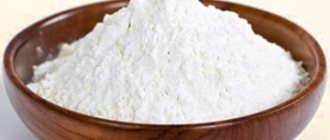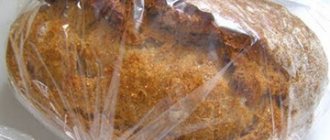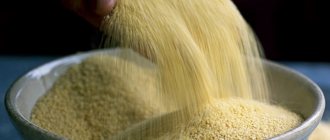Home / Products / Eggs and dairy products / Storing cottage cheese in the refrigerator
All fermented milk products tend to spoil quickly. In products treated with preservatives, the process of reproduction of starter bacteria does not stop, that is, the fermentation process continues. As a result, the shelf life of absolutely all dairy products is short. In order for them to last longer and remain just as useful, you need to know some rules. Cottage cheese will definitely last better and longer in the refrigerator. For example, the shelf life of cottage cheese in the refrigerator depends on how the cottage cheese was stored before it entered your refrigerator, whether there are preservatives in the product, and whether GOST standards were observed during the production of cottage cheese. Proper storage of cottage cheese in the refrigerator is not a tricky task, but there are mandatory requirements. Let's figure out what the conditions and shelf life of cottage cheese are.
Even the most useful and safe product can cause poisoning if the rules for its storage are violated. Not fresh cottage cheese can cause indigestion, and even worse, cause dysbacteriosis and even food poisoning. Therefore, it is very important to understand this and know how long you can store it and under what conditions without fear for your health and your loved ones.
Shelf life of cottage cheese
Natural cottage cheese is a fermented milk product that is highly perishable. The shelf life of cottage cheese is regulated by sanitary standards. Ideally, the time frame is quite long, but you can’t always be sure that you bought completely fresh cottage cheese. Therefore, it is better to know about the maximum deadlines, but not to push it to the deadline.
Cottage cheese is stored in the refrigerator from 2 to 14 days, depending on packaging and pre-treatment.
| Dependence of storage time and temperature on the type of cottage cheese | ||
| Type of cottage cheese | storage temperature | shelf life |
| Pasteurized (opened) | 0°C – + 3°C | 1 day |
| Homemade cottage cheese | 0°C – + 3°C | 2 days |
| Long-term storage (only in sealed packaging) | 0°C – + 6°C | 14 days |
| Pasteurized (in closed packaging) | 0°C – + 6°C | 5-7 days |
Outside the refrigerator, cottage cheese can remain fresh for no more than a day, and if the temperature is above 15°C, then for a matter of hours.
How long does curd mass last?
The curd mass, in addition to cottage cheese, contains vitamin supplements, sugar, carbohydrates and vegetable fats. An important component of the curd mass are organic acids - they have an antiseptic effect, extending the shelf life of the product.
A quality product must be uniform in consistency. If the structure of the curd mass consists of grains, it means that the manufacturer has added artificial thickeners to the product.
If there are no preservatives in the curd mass, it will be stored for up to 3 days. Thanks to preservatives, the shelf life of the product doubles.
Cottage cheese storage options
A few tips will help you preserve the freshness and benefits of this product in the refrigerator, but please note that they are not equally effective. Let's look at this issue in more detail.
Storage open , that is, in a plate or container (in a container in which the product can be served).
This method is used very often, since amateurs do not allow the product to spoil - it is quickly consumed at breakfast or when preparing other dishes. It is convenient and practical to hold the product in such a container. Any family member who wants to enjoy cottage cheese can set aside the required portion for themselves at any time. How long can you keep the dishes open? – no more than two days.
In a plastic bag (this is mainly how “fresh” or loose cottage cheese is sold). Many purchased cottage cheese do not unpack immediately, but leave it in the bag. In this form, the cottage cheese will not last long. Cottage cheese purchased in the morning can be considered conditionally good in the evening, since it simply “sweats” in cellophane. Therefore, after a few hours a specific musty smell appears. The product is then only suitable for baking. Without heat treatment, in its raw form, the use of such cottage cheese is strictly not recommended.
in an enamel pan or bowl . In this form, it can be stored for four to five days, and is considered fresh within two days after purchase (this is only if the product was really fresh at the time of purchase). Many cottage cheese lovers recommend covering the enamel bowl with a tight lid and putting a few pieces of refined sugar into the bowl. Sugar absorbs moisture from the product, which stops the formation of musty odors.
All these options do not allow you to significantly increase the shelf life of cottage cheese or maintain its freshness. But there is a trick, by resorting to which you can achieve an increase in terms of up to a month. Storing cottage cheese in the freezer (freezing) and in the refrigerator. Let's look at this option in more detail.
Cottage cheese has gone bad - how can you tell?
To assess whether a product is spoiled, focus on the following characteristics:
- the smell will be unpleasantly sour, rotten, moldy, bitter, old fat, nauseating;
- taste - bitter, with an extraneous, unpleasant aftertaste;
- appearance - cottage cheese with mucus, sometimes pink, gray, blue, black.
Of course, this has already been described as a critical condition, which is almost impossible not to notice. But even a minimal deviation from the norm in the taste, smell and appearance of homemade cottage cheese is a reason not to eat it!
In general, even the freshest village or farm cottage cheese is unsafe to eat raw. Unless you have your own cow or goat. Well, or you made the cottage cheese yourself (there is an excellent recipe here). And here everyone decides for himself - to take risks, hoping to get the maximum benefit, or to heat-treat the cottage cheese: prepare delicious and healthy dumplings, cottage cheese, casseroles, desserts. Cheesecakes with sour cream or jam, even those made without eggs, will please everyone.
Is it possible to freeze cottage cheese?
You can freeze cottage cheese if you do not plan to prepare a dish using this product in the near future. But this procedure must be carried out with knowledge of certain rules. In this case, the shelf life of the cottage cheese will even reach several months.
Thawed cottage cheese tastes the same as before freezing, but there may still be changes in consistency. This cottage cheese will not be crumbly like it was before freezing. It will look like a curd mass.
Cottage cheese is a very delicate, “living” product. It has a pleasant milky taste, delicate aroma, dense creamy grain texture. But it should be taken into account that all these “charms” will be lost if you decide to store the cottage cheese for a long time and use the freezer for this. Also, most of the beneficial substances that the fresh product is rich in will “disappear.”
The longer a product is stored in the freezer, the more valuable and important microelements and vitamins are lost. If the cottage cheese is prepared and the process of “quick freezing” is carried out, then there will be minimal “losses” in quality and such a product can be given in its pure form even to children.
Important! You should not freeze cottage cheese in its original packaging. In factory foil, the texture of the cottage cheese will suffer greatly. Cottage cheese bought in a plastic bag will have an unappetizing, gray tint and musty smell.
But not all dairy products are critical to frozen storage. Butter can be stored in the freezer for a long time without any problems. You can read about this in this article by following the link.
What can you cook from expired cottage cheese?
Surely every housewife has had a pack of cottage cheese lying around somewhere in the corner of the refrigerator. What to do? After the expiration date, such a product can be used, but only if there is no change in color, odor, no mold, and the expiration date is less than three days ago. Once the product has been heat treated, it can be eaten.
There are a huge number of recipes with expired cottage cheese. These include the well-known cheesecakes, casseroles, buns, dumplings, cookies and much more.
It all depends on the flight of your imagination and personal preferences. Recently, a special sensation has been caused by the “royal cheesecake”, which is easy to prepare but has a very delicate taste. Everyone has the ingredients to create it at home: raw cottage cheese, eggs, butter, flour, sugar. You will also need a little time and desire. Simple, right?
Shelf life of cottage cheese in the freezer
How long cottage cheese will be stored in the freezer depends directly on the temperature in the chamber:
- at a temperature of -2 °C you can store cottage cheese for a whole week without fear of spoilage of the product;
- from -12 to -18 °C, the cottage cheese can last for two weeks;
- at -25 °C the product will remain fresh for up to 20 days;
- when deep frozen (-35 °C), the cottage cheese will “stay” intact for up to a month.
Important to remember! Full-fat cottage cheese will be preserved in the freezer with minimal loss of quality, without significantly changing its consistency. But the dietary analogue becomes very crumbly and dry.
How expiration dates depend on packaging, fat content and manufacturing method
At retail outlets, cottage cheese of varying percentages of fat content is presented, in plastic cups or packs of various weights, intended for special dietary or baby food. Buying any curd products to suit your taste today is not difficult.
However, it should be remembered that, like any other dairy product, cottage cheese is perishable. Its specific shelf life is determined by GOST, specified in SanPiN documents and depends on:
- Heat treatment method. Factory-made cottage cheese, in the production of which special heat treatment technologies were used, will be stored longer.
- Storage temperature, which should not exceed 2-6 °C, and for cottage cheese for long-term storage, the optimal temperature is -18 °C.
- Packaging. The product in a vacuum container has the longest shelf life. It can reach 30 days. Cottage cheese is stored longer in a wrapper made of special foil or parchment than in a simple paper package.
- Fat content. Cottage cheese with a high percentage of fat content (from 18%) can stay fresh for less time than 9% semi-fat, made from whole and skim milk, or low-fat 2-5%, made from skim milk.
The fattier the cottage cheese, the less protein, moisture and acidity it contains.
Tip of the day
When purchasing cottage cheese, pay attention to the product label, which indicates the product's release date and expiration date.
Freezing technologies
It’s decided that you can freeze it. Now let's look at the nuances of the practical issues of this process. The procedure will be something like this:
- Divide the product into portions if you purchased a lot of product. This is done to ensure that each curd piece is completely used after thawing.
- If the consistency of the cottage cheese has large lumps, you should crumble them so that they freeze faster, and when defrosted, thaw faster.
- It is better to store cottage cheese in the freezer in a glass or ceramic container with a tight-fitting lid. There is no need to fill it all the way to the top, since the moisture will increase in volume during freezing.
- Be sure to put a date (put it on the lid with a marker or include a signed piece of paper) so as not to miss the expiration date.
For storing cottage cheese in the freezer, granular, but not paste-like cottage cheese is best suited. This issue has been addressed previously.
How to pack
To create optimal storage conditions, it is necessary to pay special attention to the packaging of the product. Let's look at the most common, time-tested methods of packaging your favorite treat.
Vacuum
Recently, you can often find cottage cheese products in vacuum packaging on sale. This allows it to stay fresh and retain its taste for a month. The product should be removed from the packaging immediately before consumption. Once the package has been opened, it can be stored for no more than two days.
Vacuum packaging can also be created at home. Online stores offer a device called a vacuum degasser. It is quite expensive, but at the same time convenient and easy to use.
Foil and parchment paper
When storing the curd treat in the refrigerator, it is recommended to wrap it in parchment paper or foil. This packaging method does not significantly extend its shelf life, however, when compared with using enamel or glass containers for this purpose, it can significantly save space in the refrigerator.
Cotton fabric
Cotton fabric is perfect for storing cottage cheese. It is wrapped in a slightly damp cloth and placed in a container that is closed with a lid, and then put in the refrigerator. With this packaging method, the curd does not air out and also maintains the required level of humidity.
Enamel and glassware
The ideal container for storing curd products is enamel or glassware.
You can store the curd in a glass jar or enamel pan like this:
- Line the bottom of the dish with a cloth to keep the product crumbly.
- Place a few pieces of refined sugar in a container to prevent premature spoilage of the product.
- Place the curd in a bowl, close the lid tightly and put it in the refrigerator.
If the dish does not have a lid, it can be replaced with regular cling film.
Proper defrosting of cottage cheese
No matter how long the cottage cheese lies in the freezer, the reverse process (defrosting) will take much longer. To return cottage cheese from a frozen state to an “edible” state, you don’t need to do much:
- Transfer the package with the preparation from the freezer to any shelf of the refrigerator and leave for 10-12 hours.
- Then, after making sure that the cottage cheese has completely thawed, strain the separated whey through cheesecloth.
Now, defrosted cottage cheese can be used to prepare your favorite dishes or consumed “live.”
Attention! Under no circumstances should you use heat treatment during defrosting! Exposure to even room temperature will cause product spoilage.
A few words about the product
The production of cottage cheese at a factory differs from that at home. Moreover, in the second case, the finished product has a greater chance of spoiling than in the first. If only because homemade curd mass is obtained with minimal heat treatment of sour milk. Lactic fermentation occurs here at room temperature, spontaneously. Milk fat content, as a rule, is also not taken into account.
The resulting clot is placed in special bags to remove excess whey. At the same time, it is also possible that not only bacteria, but also fungi will immediately multiply in the cottage cheese.
At factories, milk for cottage cheese is first normalized for fat content and pasteurized. Then special starter and fermentation cultures are introduced into the milk baths, operating at temperatures from 28 to 30 degrees Celsius. As a result, you get a dense curd clot. Next, it is cut into pieces to better separate the whey.
The final product in this case has the expected consumer qualities. For example, in terms of acidity and density, which cannot be said about a homemade product. In addition, factory-made curds are less susceptible to unfavorable bacterial environments. Consequently, the shelf life of such cottage cheese according to GOST and products based on it will be longer than that of homemade cottage cheese. This means that cottage cheese will retain beneficial microelements and vitamins for the consumer longer.
Today, cottage cheese is widely used in cooking - from an independent dish to baking. At the same time, the type of cottage cheese often matters in the recipe. In total, four types of product can be distinguished:
- semi-bold with fat content up to 1.8%;
- fat up to 23%;
- classic from 4 to 18%;
- low fat.
The last of the species listed is usually used in dietary and baby food.
Shelf life of homemade cottage cheese in the refrigerator
Ambiguous answer about the shelf life of homemade cottage cheese in the refrigerator. It all depends on the time period, which depends on how quickly the cottage cheese gets into the consumer’s refrigerator. A natural reasoning would be that the less time passes from the moment of production (production) of cottage cheese to placing it in the refrigerator, the longer it will remain fresh and edible.
The place for cottage cheese in the refrigerator is on the top shelf, near the freezer.
Homemade cottage cheese can be safely stored on a shelf under the freezer for up to 5 days. But in vacuum packaging (packed immediately after production), the storage time of cottage cheese can already extend up to 30 days.
Another option for extending the shelf life of homemade cottage cheese is to place it in a special chamber where the temperature is kept at a level from 0 to +1 °C with minimal humidity. But such a camera may not be in every refrigerator.
We remember that all storage conditions must be observed:
- Location in the refrigerator. Closer to the freezer, the air is colder.
- Low humidity. The drier the product, the better, the less reason for the development of bacteria.
- Correct container. A hermetically sealed container made of glass or plastic is ideal.
Store without refrigeration
Storing fermented milk products without refrigeration is dangerous to health. The maximum length of time cottage cheese can be stored without refrigeration is 6 hours.
For storage at room conditions, the product must be:
- as fresh as possible;
- chilled;
- loose;
- better dry than floating in whey;
- not covered with a lid.
- it must be placed in a cool place;
- not exposed to sunlight;
It is best to place the cooled curd in an unglazed earthenware bowl. To do this, place a pinch of coarse salt on the bottom, clean natural fabric (linen, cotton) on top, and the product on it. Instead of a lid, use a second piece of cloth soaked in a strong salt solution.
Shelf life of loose cottage cheese
Many people prefer to buy only home-made cottage cheese, believing that only such cottage cheese contains necessary and useful elements. Others buy only factory-made cottage cheese. We all have the right to choose, but we need to know that both a high-quality factory product, manufactured according to the regulations of GOST 31453 - 2013, and cottage cheese from a farm, have certain characteristics:
- the consistency is soft, plastic, with the presence of small particles of milk protein;
- the color is uniform, milky, with a slight fawn tint throughout the entire mass;
- the low-fat product releases a small amount of curd whey;
- sour milk taste;
- there is no foreign odor.
The shelf life of loose cottage cheese without packaging is 24 hours, but do not forget that cottage cheese will not be stored longer in a plastic bag (the kind of container most often used on the market).
And only pasteurized cottage cheese that has undergone heat treatment can be stored for up to 5 days.
Quality cottage cheese standards and norms
According to GOST, cottage cheese is a product obtained only from dairy raw materials through protein fermentation. Milk is fermented in two ways, using bacterial starter or rennet with calcium chloride. Types of milk used:
- whole;
- low fat;
- normalized;
- restored.
The shelf life of cottage cheese and cottage cheese products varies. The storage time is indicated in San PiN:
- natural curd product – 72 hours;
- for children – 36 hours;
- curd products – 24 hours.
GOST 31453-2013 clause 8.2 - the manufacturer can independently set the shelf life of cottage cheese and cottage cheese products.
They buy dairy products based on consistency: prepared from natural milk at low temperatures and without the use of calcium chloride, the dish will be softer, more tender, and uniform in appearance. It is this kind of food that is better absorbed by the body.











